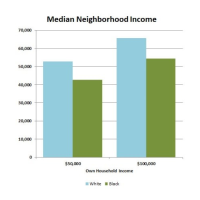White Families more likely to Live in Better Neighborhoods than Black Families with Same Income
 (graphic: Steve Straehley, AllGov)
(graphic: Steve Straehley, AllGov)
Money isn’t the great equalizer when it comes to housing and race, according to a new study.
Neighborhood Income Composition by Household Race and Income, 1990–2009 showed that when whites and blacks make the same amount of money, they don’t end up in the same type, or quality, of neighborhood.
The typical middle-income white family is more likely to reside in a good neighborhood with better schools as well as parks, daycare and so forth. But the typical black middle-income family is more likely to be in a lower-income neighborhood, according to Stanford University researchers Sean F. Reardon, Lindsay Fox and Joseph Townsend.
“I was surprised by the magnitude,” Reardon, a professor at the Stanford Graduate School of Education and the paper’s lead author, told The New York Times. “I thought comparing people at exactly the same income level would get rid of more of the neighborhood differences than it did.”
The study looked at the median income of neighborhoods in which black and white families of a given income lived. For instance, the typical black family with an income of $50,000 lives in a neighborhood in which the median income is less than $43,000. But a typical white family with the same income lives in a neighborhood with a median income of almost $53,000.
“When you look at the evidence of how important neighborhoods are, you really worry about the long-term consequences of these patterns of racial and economic segregation,” Reardon told The Washington Post.
-Noel Brinkerhoff, Steve Straehley
To Learn More:
Middle-Class Black Families, in Low-Income Neighborhoods (by David Leonhardt, New York Times)
Poor Whites Live in Richer Neighborhoods Than Middle-Class Blacks and Latinos (by Michael Fletcher, Washington Post)
Discussion (Neighborhood Income Composition by Household Race and Income, 1990–2009)
Foreclosure Crisis Increased Racial Segregation in U.S. (by Steve Straehley, AllGov)
- Top Stories
- Unusual News
- Where is the Money Going?
- Controversies
- U.S. and the World
- Appointments and Resignations
- Latest News
- Trump Orders ICE and Border Patrol to Kill More Protestors
- Trump Renames National Football League National Trump League
- Trump to Stop Deportations If…
- Trump Denounces World Series
- What If China Invaded the United States?






Comments